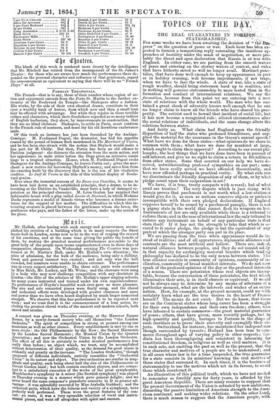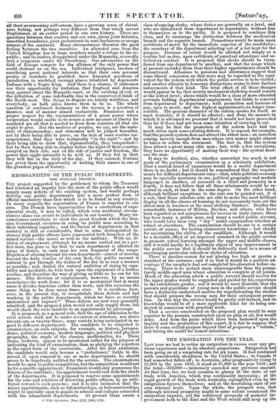TOPICS OF THE D
THE RF.A 7, GUARANTEES IN F00/Li . STATESMANSHIP. ,ic.
Fon some weeks we have been awaiting the decision of " tilt? brat peror " on the question of peace or war. Each hour has been ex- pected to furnish a temporizing reply concealing the insidious ap- proaches of hostility under the mask of negotiation, or more pro- bably the direct and open declaration that Russia is at war with England. In either case, we are parting from the smooth waters of peace and entering on the stormy waters of contest, and rules that have hitherto saved us will no longer avail. Martinet punc- tilios, that have done well enough to keep up appearances in port or in holiday cruising, will become impediments, if not traps, when we have to face the winds. A state of war, like a state of rough weather, should bring statesmen hard up to realities, and in nothing will genuine statesmanship be more tested than in the formation and conduct of international relations. We say the
formation, because from this point we are entering into a new
state of relations with the whole world. The man who has sus- tained a great shock of adversity knows well enough that he can no longer claim to know all the friends who have shared his pros- perity. The satirist used to bewail that incident of social life, but it has now become a recognized rule : altered circumstances alter the social relations of individuals, and the same change alters the relations between states.
And fairly so. What claim had England upon the friendly disposition of half the states who professed friendliness, and sup- plied the material for the assurance in the Queen's annual speech ? What have we done for those states—what opinions do we share in common with them ; what have we done for mankind at large, which ought to claim their approval ? According to our recent phi- losophy, the best things that we have done have been in pursuit of self-interest, and give us no right to claim a return in friendliness from other states. Some that counted on our help we have de- ceived, notwithstanding professed sympathies on our part ; some that we have really served we have offended theoretically, and have now offended perhaps in practical verity. By what rule can we discriminate the friendly disposition of any of them, or by what pledge count upon their cooperation in act? We have, it is true, treaty compacts with several; but of what
avail are treaties ? The very dispute which is just rising with Russia proves that parchment is not worth what a law-stationer would give for it, as soon as nations conceive objects or pretexts incompatible with their own pledged declarations. If England supposes herself to be armed by a parchment panoply, there is not a pigmy state in the world that cannot flesh its weapons on her. Instruments of law are only available while there is a tribunal to enforce them; and in the case of international law the only tribunal to enforce any instrument on behalf of any particular state is that state itself. If it has not the strength to take that which is se- cured to it under pledge, the pledge is but the equivalent of any pretext which the stronger party can put in its place.
We are passing from the time when appearances would do in-
stead of realities ; and of all appearances, diplomatic alliances and contracts are the most artificial and hollow. There are, in& ed, natural alliances between peoples, and they do not consist solely in that capacity for exchanging material benefits which trading philosophy has declared to be the only nexus between states. The trae alliance consists in community of opinions, community of in- clination, community of broad manifest interests. We do not now speak of the professed opinions of the day or the professed interests of a season. There are potentates whose real objects are inscru- table, because the conversation of those potentates, the text which illuminates their acts, is in itself obscure or equivocal. It would not be always easy to determine by any means of utterance at a particular moment, what are the interests and wishes of an entire nation. How, for example, at the present moment, could we with certainty learn what are the true desires in the heart of France herself? The means do not exist. But we do know, that there are on the Continent states whose long career has been a struggle for their own independence and their own freedom; others, who have laboured to sustain commerce—the great material guarantee of peace ; others, that have given, more recently perhaps, but in high quantity and quality, hostages to Fortune in the shape of such sacrifices as to prove their sincerity and exemplify their ob- jects. Switzerland, for instance, has maintained her independence though surrounded by tyrants ; Holland has been true to com- merce throughout ages of varying policy in other respects ; Sar- dinia has been thoroughgoing and consistent in labouring for constitutional freedom, in religious as well as civil matters. It is in such acts, not omitting the past as well as the present, that the true character and motives of a people are to be understood; and in all cases where law is for a time suspended, the true guarantee for a state consists in its ministers' knowing the real motives of those states that surround it. In such times, it is the business of statesmanship to use the motives which act in its favour, to avoid those which counteract it.
An illustration of this political truth, which we have not needed
to remember so forcibly now for forty years, is afforded by the great American Republic. There are many reasons to suppose that the present Government of the Union is actuated by new ambitions, discarding the passive limitation of American strength to the Ame- rican continent, and seeking wider relations. On the other hand, there is much reason to suppose that the American people, with all their overweening self-esteem, have a growing sense of chival- rous feeling, not perhaps very different from that which moved Englishmen at an earlier period in our own history. There are questions between that country and our own, about joint fisheries, unsettled boundaries, joint protectorate in semi-barbarous or savage corners of the continent. Many circumstances threaten the good feeling 'between the two countries. An alienated race from the United Kingdom has in large numbers sought a refuge in the re- public ; and its leaders, disappointed under the Monarchy, avowedly seek a vengeance under the Presidency. Our adversaries on the field of Europe compete for the alliance of the only power that could obstruct us on the sea. Individual intriguer; careless of -sacrificing great national interests so that their own personal profits or crotchets be gratified, have fomented questions of jurisdiction in wretched swampy places inhabited by degenerate Indians with a Negro King. And there is a chance, if statesmen use their opportunity for irritation, that England and America may quarrel about the Mosquito coast, or the catching of cod, or the definition of some indefinable line in the unsurveyed lands of the North-west. The things in dispute are totally worthless, and everybody, on both sides, knows them to be so. The whole question of continued harmony or the reverse is a question of manner, and of manner almost exclusively. Frankness and a proper respect for the representatives of a great power whose cooperation would enable us to secure a new measure of liberty for mankind are all that is needed to draw from America all that she ought to give. But the motives of peoples, we say, are the mate- rials of statesmanship ; and statesmen will be judged hereafter, not by their being able to prove, on the text of some routine cor- respondence, that they were technically "in the right "—not by their being able to show that, diplomatically, they vanquished— but by their being able to display before the sight of their country, arrayed on their side, and on the side of justice and freedom, the power that ought naturally to be with us. If they fail in that, they will fail in the duty of the day. If they succeed, Fortune has given them the opportunity of writing their names in one of the grandest pages of history.



































 Previous page
Previous page